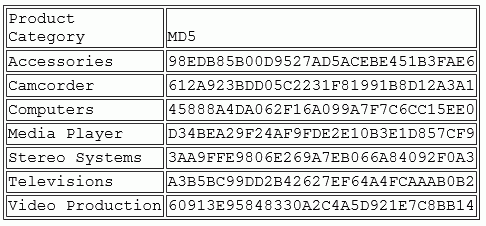Syntax: How to Compute an MD5 Hash Check Value
CHECKMD5(buffer)
where:
- buffer
-
Is a data buffer whose hash value is to be calculated. It can be a set of data of different types presented as a single field, or a group field in one of the following data type formats: An, AnV, or TXn.
Example: Calculating an MD5 Hash Check Value
The following request calculates an MD5 hash check value and converts it to an alphanumeric hexadecimal value for display.
DEFINE FILE WFLITE MD5/A32 = HEXTYPE(CHECKMD5(PRODUCT_CATEGORY)); END TABLE FILE WFLITE SUM MD5 BY PRODUCT_CATEGORY ON TABLE SET PAGE NOLEAD ON TABLE SET STYLE * TYPE=REPORT,FONT=COURIER,$ ENDSTYLE END
The output is shown in the following image. The monospaced font shows that although the input values have varying length, the output has a fixed length.
